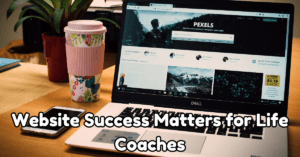
Search Site
CTRL+KSearch Site
CTRL+KPublished: 18 Nov 2024

Marketing is the most integral part of any business, and marketing for coaches is no different. Many experts suggest dedicating 80-90% of your time and budget to marketing efforts to ensure consistent growth and visibility. But for many coaches, marketing feels like an uphill battle, requiring careful strategy, creativity, and persistence.
Are you wondering how to market a coaching business?
With thousands of online coaching businesses offering similar services, simply being good at what you do isn’t enough. To attract clients and grow your business, you need to actively promote your services. Without effective marketing, even the most skilled coaches can go unnoticed.
However, marketing a coaching business comes with unique challenges, such as:
Despite these hurdles, marketing is crucial for generating a steady flow of leads and establishing your authority in the industry. In this guide, we’ll explore proven strategies, actionable tips, and real-life examples to help you succeed in successful marketing for coaches.

Marketing a coaching business differs significantly from marketing other types of services. Unlike selling products, coaching is deeply personal. When prospective clients seek a coach, they’re not just buying a service—they’re investing in themselves, trusting you to guide them through personal or professional challenges. This makes building trust and showcasing your expertise crucial in your marketing efforts.
When marketing yourself as a coach, you’re essentially selling your personality, values, and unique approach to transformation. This can feel vulnerable, as it puts you in the spotlight. Coaches often grapple with self-doubt or imposter syndrome, wondering, “Am I good enough to attract clients?” This is where effective marketing steps in, allowing you to authentically present your skills and experience.
Unlike tangible products that can be reviewed or compared side by side, coaching success is subjective. Potential clients want to see evidence of your ability to create change. Testimonials, case studies, and relatable content are powerful tools to showcase your results and connect with your audience emotionally.
Coaching often involves high-ticket packages, meaning clients take longer to decide. They may follow you on social media, read your blogs, or download your free resources before committing to a session. This extended decision-making process means your marketing must consistently nurture leads, build trust, and provide value over time.
For example, Sarah, a relationship coach, saw her business grow significantly after she began nurturing her email list with free advice on improving communication in relationships. Over several months, her audience grew familiar with her approach and expertise, and when she launched a premium course, her audience was ready to buy.
The cornerstone of successful marketing for coaches is the “know-like-trust” factor:
By embracing these principles, you can create a strong foundation for attracting and converting clients.
Every successful marketing strategy starts with a clear understanding of your audience, niche, and brand. Without these, even the best tactics will fail to resonate with potential clients.
A niche is your coaching specialty—it defines what you do, who you serve, and how you’re different. Trying to market yourself as a “general coach” is a recipe for obscurity. Instead, focus on a specific audience or problem. For example:
A defined niche allows you to tailor your messaging, address specific pain points, and position yourself as an expert. When potential clients feel like you understand their unique challenges, they’re more likely to trust you.
Once you’ve identified your niche, create a detailed profile of your ideal client. This should include:
For example, a coach specializing in career transitions might target professionals aged 30-45 who are dissatisfied with their current roles and looking for growth. Knowing this allows you to tailor your marketing messages to their needs, such as, “Feeling stuck in your career? Let me help you land your dream job.”
Your brand story is your opportunity to connect emotionally with potential clients. It’s not just about what you do—it’s about why you do it and how your experiences have shaped your approach. A strong brand story humanizes your business and makes you relatable.
For example, consider John, a life coach who specializes in helping entrepreneurs overcome burnout. John shares his story of nearly losing his own business to burnout before discovering strategies to reclaim balance. By sharing this story across his website and social media, he attracts clients who see him as someone who truly understands their struggles.
To create your brand story:
For more tips, check out the Definitive Guide to Brand Storytelling.
Your website is the foundation of your digital marketing strategy. It’s often the first impression potential clients have of your business, so it needs to be polished, professional, and user-friendly.
Key elements of a great coaching website:
A professional online presence establishes your authority and makes it easy for clients to engage with your services.

Search engine optimization (SEO) is one of the most effective ways to attract organic traffic to your coaching website. By optimizing your site to appear in search engine results for relevant keywords, you can position yourself as the go-to coach in your niche and attract clients who are actively searching for your services.
In today’s digital world, most people start their search for a coach online. If your website doesn’t appear on the first page of search results, potential clients are likely to find your competitors instead. SEO helps you bridge that gap, making your website visible to your target audience and boosting your credibility.
Search engines like Google consider several factors when ranking websites:
James, a career coach, struggled to generate leads despite having a website. His traffic was minimal, and potential clients weren’t finding him. He decided to focus on SEO, starting by researching keywords his ideal clients might use, such as “how to switch careers in your 30s” or “resume tips for executives.”
Using tools like Yoast and Ahrefs, James optimized his blog posts, added internal links between pages, and ensured his site was mobile-friendly. He also started writing blog articles that directly addressed his clients’ pain points. Within six months, his website ranked on the first page of Google for several search terms, bringing in hundreds of visitors daily. Many of these visitors became paying clients, and James’s business flourished.
By investing time in SEO, you can create a steady stream of organic leads, positioning yourself as an authority in your niche.
Email marketing is one of the most powerful tools for coaches. It allows you to build direct, personal connections with potential clients while nurturing them over time. Unlike social media, where your content competes with ever-changing algorithms, email marketing ensures your messages land directly in your audience’s inbox.
Studies show that email marketing delivers a higher return on investment (ROI) than most other marketing channels. For coaches, it’s particularly effective because it allows you to:
Email marketing is not just about promotion—it’s about providing ongoing value to your subscribers, earning their trust, and positioning yourself as the solution to their challenges.
Sarah, a confidence coach, struggled to fill her workshops until she discovered the power of lead magnets. She created a free guide titled “5 Steps to Overcome Self-Doubt,” which visitors could download in exchange for their email addresses.
Using Mailchimp, Sarah set up an automated email sequence that nurtured her subscribers over time. Her emails included:
Within three months, Sarah tripled her email list. Her workshops began selling out, and many of her subscribers became long-term coaching clients.
By investing in email marketing, you can nurture leads, build trust, and create a steady flow of clients who are genuinely interested in your coaching services.
Social media has revolutionized the way coaches connect with their audience. Platforms like Instagram, LinkedIn, and Facebook allow you to showcase your expertise, build relationships, and attract potential clients—all in real-time. However, success on social media requires more than just posting occasionally. It’s about creating meaningful content and engaging consistently with your audience.
Social media is an essential tool for coaches because it allows you to:
According to recent studies, people spend an average of 2 hours and 24 minutes daily on social media. With this much attention focused online, being active on the right platforms is critical for building your brand.
Not all platforms are created equal, and each caters to different types of audiences:
Facebook ads can transform your reach by targeting the right audience based on location, interests, and behaviors. For example, a wellness coach could run ads targeting users interested in mindfulness and fitness. Facebook claims its targeted campaigns are 89% effective, making it an excellent option for coaches looking to grow their businesses.
Consistency builds familiarity and trust. Create a content calendar to plan your posts in advance and ensure you’re engaging with your audience regularly. Tools like Hootsuite or Buffer can help you schedule content and track performance.

Blogging is one of the most effective ways to establish your authority, improve your website’s search rankings, and provide value to your audience. A well-maintained blog not only attracts visitors but also nurtures them into potential clients by demonstrating your expertise and addressing their pain points.
Blogging helps you:
A great blog post is engaging, informative, and actionable. Focus on topics that resonate with your target audience and provide immediate value. Use clear, conversational language to ensure your readers stay engaged.
For example:
Rachel, a wellness coach, started blogging to share her expertise on stress management. One of her early posts, “5 Quick Ways to De-Stress After Work,” became a hit after being shared on Pinterest. She optimized the post for SEO, and it soon ranked on Google’s first page for “quick stress relief tips.” This brought in thousands of monthly visitors and resulted in dozens of email sign-ups and new coaching clients.
Consistency is key to blogging success. Aim to publish new posts at least twice a month. You can also repurpose blog content into other formats, such as videos, infographics, or email newsletters, to reach a wider audience.
Blogging allows you to give back to the community by offering free, valuable resources. Sharing your knowledge helps build trust and creates a loyal following that supports your business.
By maintaining a blog filled with insightful, actionable content, you not only attract potential clients but also position yourself as a leader in your field. When done correctly, blogging can become a cornerstone of your marketing strategy.

For coaches looking to stand out in a crowded market, joining a professional directory is a game-changer. Directories connect coaches with potential clients who are actively seeking their services, providing a powerful way to boost visibility, credibility, and lead generation.
Directories are more than just listings; they’re communities where clients can discover coaches based on specific needs, niches, or locations. They also often come with added perks that can enhance your business, such as access to resources, blogging opportunities, and networking.
Think of directories as a shortcut to credibility. When potential clients see you listed on a trusted platform, they’re more likely to view you as a legitimate and experienced professional.
One standout example is the If I Grow Coaching Directory, which offers much more than a simple listing:
Joining a directory like If I Grow not only enhances your visibility but also positions you as a serious professional in your field. It’s a simple yet effective way to get ahead of competitors and connect with clients who are ready to invest in coaching.
Networking and referrals are the lifeblood of any coaching business. While digital marketing is crucial, nothing beats the power of personal connections. By building strong relationships, you can create a steady stream of referrals, collaborations, and opportunities.
Networking helps you expand your reach and establish credibility within your industry. Whether you’re connecting with other coaches, professionals in complementary fields, or potential clients, networking allows you to build trust and demonstrate your expertise.
Referrals are one of the most effective ways to grow your business. Satisfied clients often become your biggest advocates, spreading the word about your services to their friends, family, or colleagues.
Networking isn’t a one-and-done activity—it’s about nurturing relationships over time. After meeting someone at an event or online, follow up with a personalized email or message. Express interest in collaborating or simply keep the conversation going.
By prioritizing networking and building a strong referral system, you can expand your reach, strengthen your reputation, and create lasting connections that fuel your coaching business.
Marketing your coaching business is a journey, not a sprint. It requires a blend of creativity, strategy, and persistence. By building a strong foundation with a clear niche and compelling brand story, leveraging tools like SEO and email marketing, and engaging with your audience through social media and blogging, you can position yourself as a trusted authority in your field.
Take inspiration from James’s SEO transformation, Sarah’s lead magnet success, and Sophie’s competitive edge gained through If I Grow Coaching Directory. These strategies work because they focus on building trust, providing value, and connecting with the right audience.
Remember, you don’t have to implement every strategy at once. Start small, track your progress, and refine your approach over time. Consistency is key, and with patience, you’ll see your efforts pay off as your coaching business grows.
Don’t wait for clients to come to you—take action today! Join the If I Grow Coaching Directory to gain access to tools, resources, and a community of professionals dedicated to helping you succeed. With exclusive opportunities like blog features, podcast interviews, and client connections, If I Grow provides everything you need to stand out in a competitive market.
Start building your dream coaching business today. Click here to join the directory and take your marketing to the next level.
No results available
Reset